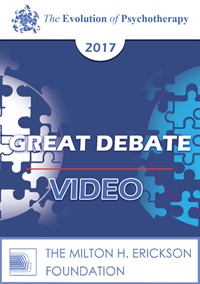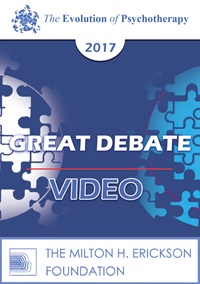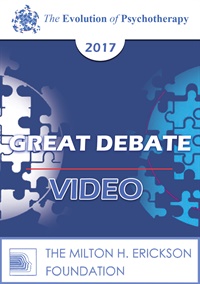
Credit available - Click Here for more information
- Average Rating:
- Not yet rated
- Topic Areas:
- Great Debates | Post-Traumatic Stress Disorder (PTSD) | Trauma | Neurobiology | Psychotherapy
- Bundle:
- Learning Track - EP17 Trauma Stream | EP17 Video Stream Build a Bundle
- Categories:
- Evolution of Psychotherapy | Evolution of Psychotherapy 2017 | Evolution of Psychotherapy Trauma Learning Track | Online Continuing Education
- Faculty:
- Donald Meichenbaum, PhD | Bessel van der Kolk, MD
- Course Levels:
- Master Degree or Higher in Health-Related Field
- Duration:
- 1:19:12
- Format:
- Audio and Video
- Original Program Date:
- Dec 14, 2017
- Short Description:
- In the aftermath of traumatic and victimizing experiences, most individuals are impacted, but 75% evidence resilience while 25% “get stuck” and develop PTSD and co-occurring disorders. This presentation will discuss what distinguishes these two groups and considers the implications for treatment.
- Price:
-
Sale is $29.00
price reduced from Base Price - $59.00

Credit available - Click Here for more information
- Average Rating:
- Not yet rated
- Topic Areas:
- Great Debates | Couples Therapy | Psychoanalysis | Conflict | Psychotherapy | Sex and Sexuality | Relationships
- Bundle:
- Learning Track - EP17 Psychoanalysis Stream | EP17 Video Stream Build a Bundle
- Categories:
- Evolution of Psychotherapy | Evolution of Psychotherapy 2017 | Evolution of Psychotherapy Psychoanalysis Learning Track | Online Continuing Education
- Faculty:
- Otto Kernberg, MD | Harville Hendrix, PhD | Helen LaKelly Hunt, PhD
- Course Levels:
- Master Degree or Higher in Health-Related Field
- Duration:
- 1:26:26
- Format:
- Audio and Video
- Original Program Date:
- Dec 14, 2017
- Short Description:
- This presentation will propose a diagnostic assessment of the couple, specifying their conflicts at the level of their sexual life, their integration of expectations regarding daily living together, and potential discrepancies regarding their value systems, including their overall social integration. On this basis, a diagnostic assessment of unconscious reactivation in both partners of unresolved conflicts in their relation with their parental couples may determine the strategy of therapeutic interventions.
- Price:
-
Sale is $29.00
price reduced from Base Price - $59.00

Credit available - Click Here for more information
- Average Rating:
- Not yet rated
- Topic Areas:
- Great Debates | Cognitive Behavior Therapy (CBT) | Experiential Therapy | Psychotherapy
- Bundle:
- Learning Track - EP17 CBT Stream | Learning Track - EP17 Erickson Stream | EP17 Video Stream Build a Bundle
- Categories:
- Evolution of Psychotherapy | Evolution of Psychotherapy 2017 | Evolution of Psychotherapy CBT Learning Track | Evolution of Psychotherapy Erickson Learning Track | Online Continuing Education
- Faculty:
- Stephen Gilligan, PhD | Donald Meichenbaum, PhD
- Course Levels:
- Master Degree or Higher in Health-Related Field
- Duration:
- 1:19:30
- Format:
- Audio and Video
- Original Program Date:
- Dec 14, 2017
- Short Description:
- This exchange will focus on the classic question of whether good therapy should focus more on cognitive or experiential changes. The merits of each, and the possibility of a “both/and” partnership, are considered.
- Price:
-
Sale is $29.00
price reduced from Base Price - $59.00

Credit available - Click Here for more information
- Average Rating:
- Not yet rated
- Topic Areas:
- Great Debates | Gender | Masculinity | Femininity | Psychotherapy
- Bundle:
- EP17 Video Stream Build a Bundle
- Categories:
- Evolution of Psychotherapy | Evolution of Psychotherapy 2017 | Online Continuing Education
- Faculty:
- Esther Perel, MA, LMFT | Marilyn Yalom, PhD
- Course Levels:
- Master Degree or Higher in Health-Related Field
- Duration:
- 1:21:00
- Format:
- Audio and Video
- Original Program Date:
- Dec 14, 2017
- Short Description:
- EP17 Great Debates 11 - Masculine/Feminine: Then and Now - Esther Perel, MA, LMFT and Marilyn Yalom, PhD Tennyson, in a nineteenth-century poem, expressed the firm belief in the difference between men and women. Man for the field and woman for the heart: Man for the sword and for the needle she: Man with the head and woman with the heart: Man to command and woman to obey. During the twentieth century, this doctrine of separate spheres was steadily eroded so that by now, in the Western world, woman are expected to use their brains as well as their hearts and men are encouraged to assume some of the roles previously allotted exclusively to women. This dialogue between Esther Perel and Marilyn Yalom will explore the challenges that men and women now face in assuming traits and roles of the opposite gender. Are we edging towards a more androgynous definition of gender and a multiplicity of gender identities? What are the lingering gaps in gender inequality? Is there a “crisis of mascu
- Price:
-
Sale is $29.00
price reduced from Base Price - $59.00

- Average Rating:
- Not yet rated
- Topic Areas:
- Great Debates | Depression | Meditation, Spirituality and Yoga | Neuroscience | Psychotherapy
- Bundle:
- EP17 Audio Streaming Build a Bundle
- Categories:
- Evolution of Psychotherapy | Evolution of Psychotherapy 2017
- Faculty:
- Daniel Amen, MD | Michael Yapko, PhD
- Duration:
- 1:29:14
- Format:
- Audio Only
- Original Program Date:
- Dec 14, 2017
- Short Description:
- Major Depressive Disorder (MDD) is the most common mood disorder on earth and earlier this year was ranked as the number one cause of suffering and disability worldwide by the World Health Organization (WHO). Depression is a complex, multi-faceted disorder and many different theories have been formulated to describe its etiology and course. In this joint presentation, Drs. Amen and Yapko will compare and contrast their viewpoints about depression, addressing such topics as the merits of neuroimaging in depression, causes and types of depression, antidepressant medications, the role of diet and use of diet supplements in treatment, and why not all psychotherapies are equally effective in promoting recovery.
- Price:
- $15.00 - Base Price

- Average Rating:
- Not yet rated
- Topic Areas:
- Great Debates | Transpersonal | Psychotherapy | Relationships | Therapeutic Relationship
- Bundle:
- EP17 Audio Streaming Build a Bundle
- Categories:
- Evolution of Psychotherapy | Evolution of Psychotherapy 2017
- Faculty:
- Jean Houston, PhD | Erving Polster, PhD
- Duration:
- 1:27:19
- Format:
- Audio Only
- Original Program Date:
- Dec 14, 2017
- Short Description:
- There is a professionally familiar dichotomy between the experience of an actual person to person relationship, on the one hand, and the transpersonal expansion. The latter is often given a special place in the therapeutic repertoire but, in actuality, they are overlapping experiences, Drs. Houston and Polster will each tell how these perspectives enter into their work, with an accompanying discussion.
- Price:
- $15.00 - Base Price

- Average Rating:
- Not yet rated
- Topic Areas:
- Great Debates | Neuro-Linguistic Programming (NLP) | Generative Psychotherapy | Psychotherapy | Relationships
- Bundle:
- EP17 Audio Streaming Build a Bundle
- Categories:
- Evolution of Psychotherapy | Evolution of Psychotherapy 2017
- Faculty:
- Robert Dilts, BA | Steven Hayes, PhD
- Duration:
- 1:25:57
- Format:
- Audio Only
- Original Program Date:
- Dec 14, 2017
- Short Description:
- Generative processes are those that promote innovation, evolution and growth. To “generate” means to create something new. Thus, the core focus in of generative change is creativity: How do you create a successful and meaningful work life? How do you create great personal relationships? How do you develop a great relationship with yourself—your body, your past, your future, your wounds and your gifts? These are the basic challenges in leading an extraordinary life, and the processes of generative change offer a way to succeed at them.
- Price:
- $15.00 - Base Price

- Average Rating:
- Not yet rated
- Topic Areas:
- Great Debates | Attachment | Psychotherapy | Couples Therapy | Family Therapy
- Bundle:
- EP17 Audio Streaming Build a Bundle
- Categories:
- Evolution of Psychotherapy | Evolution of Psychotherapy 2017
- Faculty:
- Sue Johnson, EdD | Daniel Siegel, MD
- Duration:
- 1:25:28
- Format:
- Audio Only
- Original Program Date:
- Dec 14, 2017
- Short Description:
- We will debate the Promise of attachment science as a guide to the practice of individual couple and family therapy in the 21st century including what this science tells us about how to understand mental health issues and the most direct pathways to positive change, health and resilience.
- Price:
- $15.00 - Base Price

- Average Rating:
- Not yet rated
- Topic Areas:
- Great Debates | Gestalt | Strategic Therapy | Psychotherapy
- Bundle:
- Learning Track - EP17 Gestalt Download | EP17 Audio Streaming Build a Bundle
- Categories:
- Evolution of Psychotherapy | Evolution of Psychotherapy 2017 | Evolution of Psychotherapy Gestalt Learning Track
- Faculty:
- Erving Polster, PhD | Cloe Madanes, HDL, LIC
- Duration:
- 1:24:56
- Format:
- Audio Only
- Original Program Date:
- Dec 14, 2017
- Short Description:
- Strategic therapy and present centered therapy have often received attention as discretely different phenomena. Cloe Madanes will present her views of strategic therapy and its relevance for present centered therapy. Erving Polster will do the same, showing the disparity and commonality of the two. Their individual views will animate a conversation with each other.
- Price:
- $15.00 - Base Price
Please wait ...

